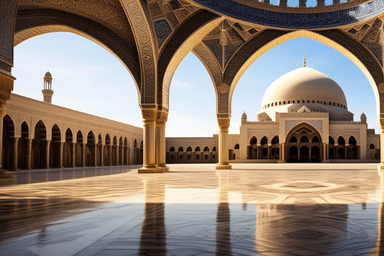The Quran is Allah’s (Ishgranth) Book. The lessons revealed in the Quran are essentially the same as those revealed in the earlier celestial scriptures, but the pre-celestial documents have not been maintained in their original form, and subsequent alterations have rendered them untrustworthy, whereas the Qur’an has been totally preserved in its original form. As a result, it is a writing that can be trusted.
The Quran contains 114 surahs (chapters). The heart of what it says is that man should believe in a single God. He holds himself accountable in front of him. Let him believe that the things revealed by God through Muhammad (PBUH) , the last messenger, are all genuine, and that believing them is the cornerstone of man’s eternal redemption.
The Quran’s original quality is not just that it is one of many divine books, but that it is the sole reliable book among many divine books; for all other manuscripts have been historically unreliable as a result of changes. When a person who believes in pre-heavenly texts picks up the Qur’an, he does not abandon his faith, but rather receives it in a more refined form.
The Quran is the holy book that God sent to everyone. It is man’s book because it was sent by God, who is every man’s God, and not by anyone else.
The Quran is not a new divine text. The pre-Akashic writings in a later edition. As if the Qur’an is a book for all humans and races. It is a manifestation of Yariya-Krupa for all. It is God’s flawless message to everyone. The Quran is the light of guidance for the entire world, much like the sun is the medium of light and energy for the entire globe.
The Quran is the holy book of Islam and serves as a guiding light for over 1.8 billion Muslims worldwide. Considered by Muslims to be the word of God as revealed to the Prophet Muhammad, the Quran is held in the highest regard and is considered the ultimate source of truth and guidance. Its teachings and principles encompass various aspects of life, including morality, spirituality, social justice, and guidance for personal conduct.
The Quran was revealed to Prophet Muhammad over a period of 23 years, beginning in 610 CE. Muslims believe that the angel Gabriel delivered the divine messages to the Prophet, who then relayed them to his followers and the people of Arabia. The revelations were recorded in Arabic and, eventually, compiled into a single book after the Prophet’s death.
The Quran is divided into 114 chapters, known as surahs, which vary in length. The longest chapter, Al-Baqarah, contains 286 verses, while the shortest chapter, Al-Kawthar, consists of only three verses. Each surah addresses specific themes, offers guidance on various aspects of life, and imparts spiritual lessons.
The Quran covers a wide range of topics, including theological beliefs, ethical principles, stories of previous prophets, and laws governing various aspects of life. It addresses issues such as justice, compassion, forgiveness, and the importance of faith in God. It also provides guidance on personal conduct, family life, and relationships within society.
Muslims consider the Quran to be a timeless and universal book, as its teachings are meant to guide humanity for all times and places. It is believed to offer solutions to the challenges faced by individuals and societies, regardless of their cultural or geographical contexts. The Quran encourages Muslims to seek knowledge, reflect on its verses, and apply its principles in their daily lives.
One of the distinctive features of the Quran is its literary excellence. The Arabic language in which it is written is considered by scholars to be unparalleled in its beauty and eloquence. The Quran’s verses are often characterized by rhythmic patterns and alighting phonetic qualities, which add to its aesthetic appeal. Its poetic style is not only captivating but also emphasizes the importance of listening and reciting the verses.
The Quran has been translated into numerous languages, allowing non-Arabic speakers to access its teachings. However, many Muslims believe that the true essence and depth of the Quran can only be fully appreciated in its original form. As a result, the mastery of the Arabic language and the ability to recite the Quran correctly hold great importance within the Muslim community.
The Quran holds a central place in the hearts and minds of Muslims around the world. It is recited during daily prayers, recited during special occasions, and serves as a source of comfort and solace for individuals in times of distress. Muslims strive to understand the Quran’s teachings and apply them in their lives, seeking to align their actions with the divine guidance contained within its verses.
In conclusion, the Quran is a book of profound significance to Muslims. It is believed to be the word of God and provides guidance on various aspects of life. With its timeless teachings, literary excellence, and spiritual depth, the Quran holds a revered place in the hearts of Muslims. Its impact extends beyond religious rituals, shaping the beliefs and actions of Muslims across the globe.


